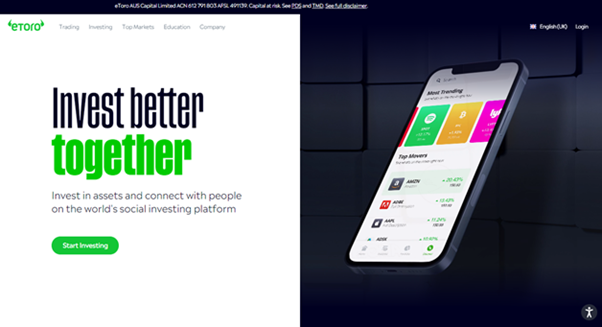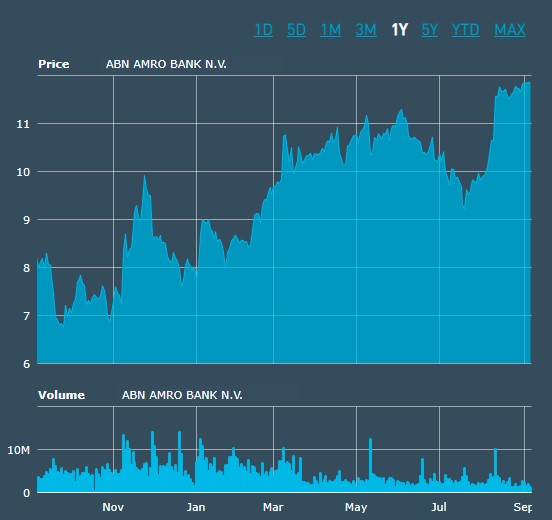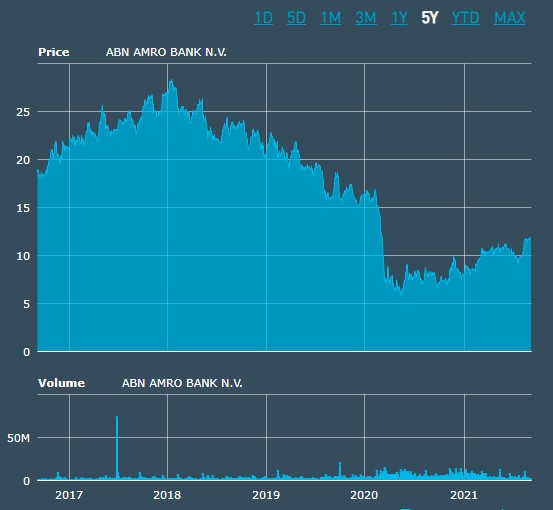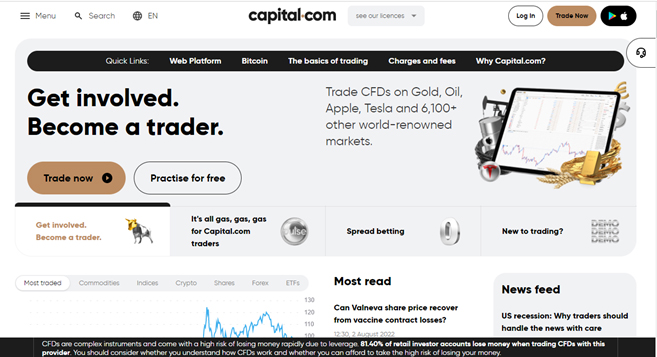How to buy ABN AMRO stocks in 2025

ABN AMRO Bank is a Dutch bank headquartered in Amsterdam, Netherlands. It provides asset management, investment banking, commercial banking, retail and private banking services to its clients, and is one of the largest banks in the Netherlands in terms of total assets. The bank operates in the financial services industry alongside other prominent banks, including ING Bank, Coöperatieve Rabobank, BNG Bank, and others. Its depositary receipts are listed on the Euronext Amsterdam (AEX), the stock exchange of the Netherlands. The article explains how you can buy ABN AMRO stock and provides in-depth information about the company.
How to Buy ABN Stocks in 5 Easy Steps
-
1Visit eToro through the link below and sign up by entering your details in the required fields.
-
2Provide all your personal data and fill out a basic questionnaire for informational purposes.
-
3Click 'Deposit', choose your favourite payment method and follow the instructions to fund your account.
-
4Search for your favourite stock and see the main stats. Once you're ready to invest, click on 'Trade'.
-
5Enter the amount you want to invest and configure your trade to buy the stock.
Top 3 Brokers to Invest in ABN AMRO
1. eToro
There are several reasons why eToro has won a spot on our list and has been heralded as having a large market share of traders. Thanks to its consistency over the years, eToro has gained the trust and loyalty of over 17 million users. You can read our full eToro review here.

Security and Privacy
Security and privacy are arguably the most important factors that determine your choice of a brokerage platform. eToro takes the privacy and security of its users very seriously. The platform adopts a thorough security procedure with fewer odds of loss or leakage of information. eToro is regulated by the Cyprus Securities and Exchange Commission (CySEC) and the Financial Conduct Authority (FCA). The platform also adopts the two-factor authentication (2FA) method and uses SSL encryption to prevent security breaches.
Fees & Features
eToro operates a no-commission policy for deposits. However, to promote active trades on the platform, users are charged a monthly fee of £10 for the inactivity fee.
eToro offers a wide scope of offering cuts across several markets, including forex, stocks, and cryptocurrency, aiding an all-in-one trading experience.
Being a beginner-friendly platform, it offers the copy trading feature to help beginner traders leverage the advanced trading strategies used by expert traders. The platform itself also offers winning strategies to guide trade.
| Fee Type | Cost |
| Commission Fee | 0% |
| Deposit Fee | £0 |
| Withdrawal Fee | £5 |
| Inactivity Fee | £10 (monthly) |
Pros
- Copy trading feature
- Ease of use for both new and experienced traders
- Operation across different financial markets
- No commission fee policy
Cons
- Customer service offerings are limited.
2. Capital.com
Capital.com is a reputable brokerage that supports trading on several financial markets. The provisions of its trading terms and the quality of innovation and efficiency of operation offered through the platform's features have granted it a market share of over 5 million users. Other benefits of the platform are no commission, low overnight fees, and tight spreads. You can read our full Capital.com review here.
Security and Privacy
Accredited by financial regulatory bodies including the FCA, CySEC, ASIC, and the FSA, Capital.com adheres to industry security guidelines in protecting its users. In addition, the platform complies with PCI Data Security Standards to safeguard customers’ information.
Fees & Features
Capital.com is popular for its offer of free brokerage services. With no hidden charges, inactivity charges, or withdrawal charges, Capital.com operates a transparent fee procedure. The bulk of the fees charged by Capital.com are Spread charges.
Capital.com’s mobile trading app has an AI-powered tool that provides clients with personalized transformation through its detection algorithm. In addition, the platform has an efficient and responsive customer support team serving multilingual customers via email, phone calls, and live chat channels round the clock.
| Fee Type | Cost |
| Commission Fee | 0% |
| Deposit Fee | £0 |
| Withdrawal Fee | £0 |
| Inactivity Fee | £0 |
Pros
- Responsive customer support team
- Ease of use with the MetaTrader integration
- Commission-free trading policy
Cons
- CFDs restrictions.
3. Skilling
For a broker that originated in 2016, Skilling’s journey to the top has been impressive. The platform offers services across multiple asset trades, serves advanced trading strategies to experienced traders, and offers commission-free services. You can read our full Skilling review here.
Security and Privacy
Skilling is regulated and accountable to highly reputable financial regulatory bodies like the FSA and CySEC. In addition, the platform maintains a different bank account for monies paid by traders to enhance the security of funds.
Fees & Features
Skilling, like eToro and Capital.com, offers commission-free services. The fees are charged as Spreads and vary based on share type. Another upside to trading on Skilling is flexibility and choice. The platform offers two varieties of accounts for trading CFDs on forex and metals. The first is the Standard Skilling account with bigger spreads and no commissions. In contrast, the Premium account offers reduced spreads and charges commissions on spot metal and forex CFD trades. In addition, Skilling offers features such as a demo account, mobile apps, and a trade assistant.
| Fee Type | Cost |
| Commission Fee | 0% |
| Deposit Fee | £0 |
| Withdrawal Fee | No fixed cost |
| Inactivity Fee | £0 |
Pros
- No-commission fee policy
- Responsive support team
Cons
- Technical for novice traders
- Service unavailable in countries such as U.S and Canada.
Everything You Need To Know About ABN AMRO
Savvy investors evaluate a company on a variety of factors and gather as much information as they can before investing their money. Having a basic understanding of a company’s history, business strategy, sources of revenue, and past performance can help you determine the suitability of the company for your investment. You can also conduct fundamental analysis to calculate the true worth of a stock by analyzing its key financial metrics.
ABN AMRO History
ABN AMRO Bank was founded in 1991 after a merger of Algemene Bank Nederland (ABN) and AMRO Bank. The bank is owned by its parent company, ABN AMRO Group. A consortium of three banks, namely Banco Santander, Royal Bank of Scotland Group, and Fortis acquired it and was divided among the three entities. However, during the global financial crisis of 2007-08, the merged banks fell into trouble, which prompted the Dutch government to bail out Fortis and split the bank’s dutch assets from Fortis and the UK-controlled RBS bank. In 2010, the Dutch government legally demerged ABN AMRO and released its assets from the RBS to form ABN AMRO Group N.V. In 2015, the Dutch government issued 20% shares of the bank through an IPO on the Amsterdam stock exchange. In the US, the stock trades on the over-the-counter markets.
What is ABN AMRO’s Strategy?
The management of ABN AMRO identifies three key strategic pillars that form the bank’s strategy: customer experience, sustainability, and future-proofing the bank. The customer experience strategy is centred around the digitalization of the bank’s services to allow clients access to their accounts 24/7. The bank aims to support companies with sustainable business models through its financing for renewables projects. Circular economy and climate change are other areas where the bank wants to play its role by advancing financing to the business involved. The bank’s management’s strategic focus is to future-proof the bank by optimizing its operating model, strengthening the compliance and risk framework, and building a skilled workforce. The bank expects to save around EUR 700 million and cap the costs at EUR 4.7 billion by 2024.
How Does ABN AMRO Make Money?
The bank’s revenue comes primarily from three main sources: interest income, fee & commission income, and trading income. It derives most of its interest income from loans and advances to customers, securities financing, loans and advances to other banks, and non-trading derivatives for cash flow hedges. Fee & commission income comes from payment services, insurance and investment fees, portfolio management & trust fees, securities & custodian services. The trading income of the bank includes equity & commodity trading and forex transactions profit/loss.
How Has ABN AMRO Performed in Recent Years?
The stock gained around 48% as it jumped from €8 on September 8, 2020, to €11.862 (its one-year high) on September 7, 2021. The lowest point attained during this period was €6.79.

ABN AMRO 1-Year Chart (Source: Euronext.com)

ABN AMRO 5-Year Chart (Source: Euronext.com)
The stock lost around 37% during the past five years as it declined from €18.775 to €11.834. In January 2018, the stock touched its five-year high of 28.18 and, since then, has been declining continuously until it hit its low of €6.048 in May 2020. The stock recouped some of its losses after its five-year low.
Where Can You Buy ABN AMRO Stock?
You can buy ABN AMRO stock by opening an equity trading account with a stockbroker. Some brokers also offer a margin trading account that allows you to borrow money from your broker to open larger trades than you would otherwise be able to open. Robo advisors, or automatic computerized portfolio managers, are growing in popularity if you want a computer or software to manage your portfolio for you.
ABN AMRO Fundamental Analysis
Unlike technical analysis, which traders use to look for patterns in share price movements, fundamental analysis is what investors use to determine the underlying health and intrinsic value of a company. Analyzing key financial metrics, such as P/E ratio, revenue, earnings per share, dividend yield, and cash flow provide vital insights into the financial health of the company and are essential to determine the fair value of a stock.
ABN AMRO’s Revenue
The revenue of a company denotes the amount earned by selling products or services. A significant increase in revenue in comparison to previous periods is seen as a good sign. Revenue is also called the ‘top line’ and can be seen in the income statement of the company, which is reported quarterly or annually. ABN Amro reported its half-yearly 2021 revenue of €3,579 million.
ABN AMRO’s Earnings-per-Share
Earnings-per-share of a company is calculated by dividing the company’s net profit by the total number of common shares outstanding. The metric shows how much earnings are available for each outstanding share. If a company reports a loss, the measure calculates loss per share. ABN AMRO registered a profit of €393 million in Q2 2021, which translates into earnings-per-share of €0.39.
ABN AMRO’s P/E Ratio
The P/E, or price-to-earnings ratio, measures the market price of a stock in relation to its earnings per share. ABN AMRO registered a profit of €393 million with per-share earnings of €0.39 for Q2 2021, so at a stock price of $12, the P/E ratio turns out to be 12/0.39 = 31. Put simply, it would take 31 years worth of earnings to pay back your investment in this stock.
ABN AMRO’s Dividend Yield
The dividend yield measures the amount of dividend a company pays out as a percentage of the stock’s market price. Barring 2020 when it incurred a loss, ABN AMRO paid out regular annual dividends of €0.84, €1.09, €1.45, and €1.40 from 2016 through 2019. The dividend yields of ABN AMRO stock were 7.06% and 8.63% in 2018 and 2019.
Stocks that have consistent high dividend yields pay out regular dividends, providing investors with a high return on their investments. Unlike “investors”, “traders” aim to exploit the short-term movements in stocks, so they are unconcerned about holding stocks for the long term to get dividends.
The ex-dividend date is usually set one business day before the record date, and investors who own the stock at least one business day before the ex-dividend date are eligible to receive dividends. Typically, the stock price drops by the amount of dividend on the ex-dividend date, which ensures that investors buying the stock for one day just to get the dividends don’t get an unfair advantage.
ABN AMRO’s Cash Flow
The cash flow of a company represents the total cash position of the company on a particular date and determines whether the company’s cash reserves have increased or depleted during the reported year. A company that has a positive net cash flow position has generated more cash than it used during the reported period. You can see the company’s cash position in its cash flow statement.
ABN AMRO bank reported €74,499 million cash and cash equivalents as of 30th June 2021.
Why Buy ABN AMRO Stocks?
The bank generated a profit of €393 million in Q2 2021 on the back of strong operational performance and higher asset management fees and commissions. The better economic outlook resulted in an impairment release of €79 million for Q2 2021. The bank’s Basel III ratio at 18.3% and Basel IV ratio at 16% showed a strong capital position of the bank. During the second quarter of 2021, the bank increased its market share in residential mortgages by 2% (from 14% in Q2 2020), which depicts the strong capabilities of the bank in the market. At the time of writing, the management is embarking on reshaping the bank through its three-pronged strategy of customer experience, sustainability, and future-proofing the bank.
The management aims to increase its market share by focusing on SMEs, mortgages, affluent customers, and corporate banking in the Netherlands and Northwest Europe. The management’s growing focus is on increasing the volume of sustainable client loans and ESG & Impact investments from 20% to around 33% in 2024. Holding ABN AMRO’s stock can give you the following benefits:
- Except for 2020 when it suffered a loss, ABN AMRO bank has been paying out healthy dividends to its shareholders. So, you can expect to get generous dividends by buying the stock.
- ABN AMRO is a state-owned bank and is one of the top players in the Netherlands in retail banking, commercial banking, private banking, and corporate & investment banking. The bank has been actively engaged in increasing its market share in different market segments, which can result in further growth in its revenues.
- The bank enjoys a strong financial position as confirmed by its Basel III and Basel IV ratios and strong cash position, which makes it a safe prospect for investment.
Expert Tip on Buying ABN AMRO Stock
“ You can consider including this stock in your portfolio to realize steady dividends, but do not overexpose yourself to one stock as your investment can go up and down over years. You can take short-term positions in the stock if you want to play by the technicals or you want to trade short-term triggers. However, you must always use risk management techniques to limit your downside risk before executing any trade, whether long-term or short-term. ”
5 Things to Consider Before You Buy ABN AMRO Stock
Here are a few things to consider before buying ABN AMRO stock.
1. Understand the Company
You can determine the value of the company’s stock and its prospects by understanding the company’s business model, revenue sources, products & services, financial statements, risk areas, strengths, opportunities, and competitive environment. Uninformed investors who buy a stock at the wrong time when risks are surrounding the company can take years to recover their investments. You must study the financial statements and annual reports of the company to have a thorough understanding of the company’s current position in the industry.
2. Understand the Basics of Investing
You should understand and follow the basic principles of investing, which will help you fare much better in the market than those who disregard these principles. For example, you should always diversify your risk by building a portfolio of different stocks so that even if one of your stock holdings goes bust, the investments in other stocks come to your rescue. For short-term trading, your order size should correspond with your risk tolerance and every order should be accompanied by a stop-loss point that will limit your losses.
3. Carefully Choose Your Broker
Selecting the right type of broker will help you a great deal in your trading. You should open your account with a regulated broker to reduce the risk of getting defrauded. Brokers that provide you with access to an advanced trading platform with mobile trading functionality can give you a significant advantage as you can monitor the markets from anywhere on the go. Trading fees, commissions, and access to trading instruments are other important factors that you should consider when selecting a broker.
4. Decide How Much You Want to Invest
You will find plenty of investment opportunities, so don’t put all of your money in one stock thinking of it as a once-in-a-lifetime opportunity. Many novice traders get carried away at the thought of earning quick money as they borrow funds or use leverage only to wipe their accounts quickly. The key is to get yourself familiar with the market, learn the techniques of money management, and calculate your position size to limit your downside risk.
5. Decide On a Goal for Your Investment
Your investment goal determines your investment strategy and the level of risk you adopt. If you want to generate quick profits, you might have to use leverage and assume higher risk. On the other hand, if you want to create a portfolio for your retirement, you should buy and hold stocks with high growth potential that you can hold for the long term. If your goal is to generate periodic income, you can invest in high dividend yield or dividend stocks.
The Bottom Line on Buying ABN AMRO Stocks
Buying ABN AMRO’s stock provides you with exposure to a Dutch bank and the banking and financial industry sector of the stock market. The bank is one of the largest banks in the Netherlands in terms of the value of assets owned. It generated a healthy profit of €393 million in Q2 2021, with a solid market position and client base in the commercial, retail, private, and corporate & investment banking segments that make up for stable revenue streams. On top of that, the bank provides its investors with a decent dividend yield, so you can expect to earn dividend income along with the potential to generate capital gains.
You will need to open an equity account with a stockbroker to buy ABN AMRO stock or any other stock of your liking. Stockbrokers allow you to trade using online trading platforms that you can use on your mobile phone, laptop, tablet, or desktop computer. You can place different types of orders, such as limit order, market order, stop-limit order, stop-loss order, and other specialized orders. You can place a market order if you want to buy or sell at the market price. A limit order, on the other hand, executes your order at your specified price if the market price moves to your stated price.
You can learn more about investing and find valuable information on many interesting stocks in the guides on our website. You can also consider opening a demo account with a broker to learn trading strategies using virtual money.
Frequently Asked Questions
-
ABN AMRO stock is listed on the Euronext Amsterdam (AEX) stock exchange as depositary receipts. The stock also trades on the over-the-counter market in the USA.
-
You need to own ABN AMRO stock before the ex-dividend date to be eligible for dividends announced by the board of directors.
-
If you have a short-term investment horizon, you should use technical analysis and trade the stock using technical indicators and price charts. You can also keep yourself updated about any short-term market triggers that might move the stock’s price.
-
You should study the management’s strategy, the company’s important financial metrics, competitive environment, and many other related factors to build your investment case. However, you should also evaluate other stocks from the industry to determine whether the stock is trading at a bargain price and provides value for your money.
-
The bank paid out annual dividends of €0.84, €1.09, €1.45, and €1.40 from 2016 through 2019.
-
Banks earn a significant portion of their total earnings as interest income, so higher interest rates are beneficial for banking stocks such as ABN AMRO.







